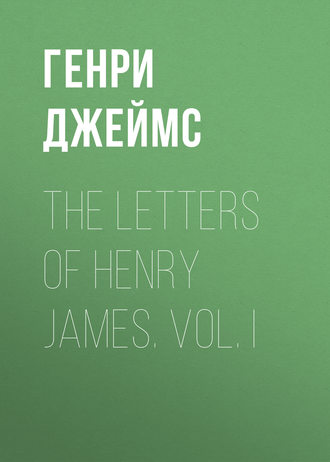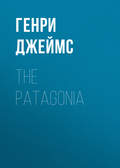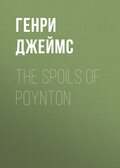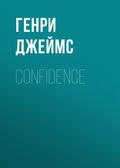
Генри Джеймс
The Letters of Henry James. Vol. I
To Charles Eliot Norton
Dictated.
Lamb House, Rye.* Please read postscript first.24 November 1899.
My dear Charles,
I heartily welcomed your typed letter of a couple of months ago, both for very obvious and for respectable subsidiary reasons. I am almost altogether reduced—I would much rather say promoted—to type myself, and to communicate with a friend who is in the same predicament only adds to the luxury of the business. I was never intended by nature to write—much less to be, without anguish, read; and I have recognised that perfectly patent law late in the day only, when I might so much better have recognised it early. It would have made a great difference in my life—made me a much more successful person. But "the New England conscience" interposed; suggesting that the sense of being so conveniently assisted could only proceed, somehow, from the abyss. So I floundered and fumbled and failed, through long years for the mere want of the small dose of cynical courage required for recognising frankly my congenital inaptitude. Another proof, or presumption, surely, of the immortality of the soul. It takes one whole life—for some persons, at least, dont je suis—to learn how to live at all; which is absurd if there is not to be another in which to apply the lesson. I feel that in my next career I shall start, in this particular at least, from the first, straight. Thank heaven I don't write such a hand as you! Then where would my conscience be?
You wrote me from Ashfield, and I can give you more than country for country, as I am still, thank heaven, out of town—which is more and more my predominant and natural state. I am only reacting, I suppose, against many, many long years of London, which has ended by giving me a deep sense of the quantity of "cry" in all that life compared to the almost total absence of "wool." By which I mean, simply, that acquaintances and relations there have a way of seeming at last to end in smoke—while having consumed a great deal of fuel and taken a great deal of time. I dare say I shall some day re-establish the balance, and I have kept my habitation there, though I let it whenever I can; but at present I am as conscious of the advantage of the Sussex winter as of that of the Sussex summer. But I've just returned from three days in London, mainly taken up with seeing my brother William as to whom your letter contained an anxious inquiry to which I ought before this to have done justice. The difficulty has been, these three months, that he has been working, with the most approved medical and "special" aid, for a change of condition, which one hoped would have been apparent by now—so that one might have good news to give. I am sorry to say the change remains, as yet, but imperfectly apparent—though I dare say it has, within the last month, really begun. His German cure—Nauheim—was a great disappointment; but he is at present in the hands of the best London man, who professes himself entirely content with results actually reached. The misfortune is that the regimen and treatment—the "last new" one—are superficially depressing and weakening even when they are doing the right work; and from that, now, I take William to be suffering. Ci vuol pazienza! He will probably spend the winter in England, whatever happens. Only, alas, his Edinburgh lectures are indefinitely postponed—and other renouncements, of an unenlivening sort, have had, as indispensable precautions and prudences, to follow. They have placed their little girl very happily at school, near Windsor; they are in convenient occupation, at present, of my London apartment; and luckily the autumn has been, as London autumns go, quite cheerfully—distinguishably—crepuscular. I am two hours and a half from town; which is far enough, thank heaven, not to be near, and yet near enough, from the point of view of shillings, invasions and other complications, not to be far; they have been with me for a while, and I am looking for them again for longer. William is able, fortunately, more or less to read, and strikes me as so richly prepared, by an immense quantity of this—to speak of that feature alone—for the Edinburgh lectures—that the pity of the frustration comes home the more. A truce, however, to this darksome picture—which may very well yet improve.
I went, a month ago, during a day or two in town, down to Rottingdean to lunch with the Kiplings (those Brighton trains are wondrous!) but failed, to my regret, to see Lady Burne-Jones, their immediate neighbor, as of course you know; who was perversely, though most accidentally, from home. But they told me—and it was the first I knew—of her big project of publishing the dear beautiful man's correspondence: copious, it appears, in a degree of which I had not a conception. Living, in London, near him, though not seeing him, thanks to the same odious London, half so often as I desired, I seldom heard from him on paper, and hadn't, at all, in short, the measure of his being, as the K.'s assured me he proves to have been, a "great letter-writer."
(28th Nov.)
I was interrupted, my dear Charles, the other day: difficulties then multiplied, and I only now catch on again. I see, on reading over your letter, that you are quite au courant of Lady B. J.'s plan; and I of course easily take in that she must have asked you, as one of his closest correspondents, for valuable material. Yet I don't know that I wholly echo your deprecation of these givings to the world. The best letters seem to me the most delightful of all written things—and those that are not the best the most negligible. If a correspondence, in other words, has not the real charm, I wouldn't have it published even privately; if it has, on the other hand, I would give it all the glory of the greatest literature. B. J.'s, I should say, must have it (the real charm)—since he did, as appears, surrender to it. Is this not so? At all events we shall indubitably see.... As for B. J., I miss him not less, but more, as year adds itself to year; and the hole he has left in the London horizon, the eclipse of the West Kensington oasis, is a thing much to help one to turn one's back on town: and this in spite of the fact that his work, alas, had long ceased to interest me, with its element of painful, niggling embroidery—the stitch-by-stitch process that had come at last to beg the painter question altogether. Even the poetry—the kind of it—that he tried for appeared to me to have wandered away from the real thing; and yet the being himself grew only more loveable, natural and wise. Too late, too late! I gather, à propos of him, that you have read Mackail's Morris; which seems to me quite beautifully and artistically done—wonderful to say for a contemporary English biography. It is really composed, the effect really produced—an effect not altogether, I think, happy, or even endurable, as regards Morris himself—for whom the formula strikes me as being—being at least largely—that he was a boisterous, boyish, British man of action and practical faculty, launched indeed by his imagination, but really floundering and romping and roaring through the arts, both literary and plastic, very much as a bull through a china-shop. I felt much moved, after reading the book, to try to write, with the aid of some of my own recollections and impressions, something possibly vivid about it; but we are in a moment of such excruciating vulgarity that nothing worth doing about anything or anyone seems to be wanted or welcomed anywhere. The great little Rudyard—à propos of Rottingdean—struck me as quite on his feet again, and very sane and sound and happy. Yet I am afraid you'll think me a very disgusted person if I show my reserves, again, over his recent incarnations. I can't swallow his loud, brazen patriotic verse—an exploitation of the patriotic idea, for that matter, which seems to me not really much other than the exploitation of the name of one's mother or one's wife. Two or three times a century—yes; but not every month. He is, however, such an embodied little talent, so economically constructed for all use and no waste, that he will get again upon a good road—leading not into mere multitudinous noise. His talent I think quite diabolically great; and this in spite—here I am at it again!—of the misguided, the unfortunate "Stalky." Stalky gives him away, aesthetically, as a man in his really now, as regards our roaring race, bardic condition, should not have allowed himself to be given. That is not a thing, however, that, in our paradise of criticism, appears to occur to so much as three persons, and meanwhile the sale, I believe, is tremendous. Basta, basta.
We are living, of course, under the very black shadow of S. Africa, where the nut is proving a terribly hard one to crack, and where, alas, things will probably be worse before they are better. One ranges one's self, on the whole, to the belief not only that they will be better, but that they really had to be taken in hand to be made so; they wouldn't and couldn't do at all as they were. But the job is immense, complicated as it is by distance, transport, and many preliminary illusions and stupidities; friends moreover, right and left, have their young barbarians in the thick of it and are living so, from day to day, in suspense and darkness that, in certain cases, their images fairly haunt one. It reminds me strangely of some of the far-away phases and feelings of our big, dim war. What tremendously ancient history that now seems!—But I am launching at you, my dear Charles, a composition of magnitude—when I meant only to encumber you with a good, affectionate note. I have presently to take on myself a care that may make you smile; nothing less than to proceed, a few moments hence, to Dover, to meet our celebrated friend (I think she can't not be yours) Mrs. Jack Gardner, who arrives from Brussels, charged with the spoils of the Flemish school, and kindly pays me a fleeting visit on her way up to town. I must rush off, help her to disembark, see all her Van Eycks and Rubenses through the Customs and bring her hither, where three water-colours and four photographs of the "Rye school" will let her down easily. My little backwater is just off the highway from London to the Continent. I am really quite near Dover, and it's absurd how also quite near Italy that makes me feel. To get there without the interposition of the lumbering London, or even, if need be, of the bristling Paris, seems so to simplify the matter to the mind. And yet, I grieve to say that, in a residence here of a year and a half, I have only been to patria nostra once.... Good-bye, my dear Charles—I must catch my train. Fortunately I am but three minutes from the station. Fortunately, also, you are not to associate with this fact anything grimy or noisy or otherwise suggestive of fever and fret. At Rye even the railway is quaint—or at least its neighbours are.
Yours always affectionately,HENRY JAMES.January 13, 1900.
P.S. This should be a prescript rather than a postscript, my dear Charles, to prepare you properly for the monstrosity of my having dictated a letter to you so long ago and then kept it over unposted into the next century—if next century it be! (They are fighting like cats and dogs here as to where in our speck of time we are.) There has been a method in my madness—my delay has not quite been, not wholly been, an accident; though there was at first that intervention. What happened was that I had to dash off and catch a train before I had time to read this over and enclose it; and that on the close of that adventure, which lasted a couple of days and was full of distractions, I had in a still more belated and precipitate way to rush up to London. These sheets, meanwhile, languished in an unfrequented drawer into which, after hurrying off, I had at random thrust them; and there they remained till my return from London—which was not for nearly a fortnight. When I came back here I brought down William and his wife, the former, at the time, so off his balance as to give me almost nothing but him to think about; and it thereby befell that some days more elapsed before I rediscovered my letter. Reading it over then, I had the feeling that it gave a somewhat unduly emphasised account of W.; whereupon I said to myself: "Since it has waited so long, I will keep it a while longer; so as to be able to tell better things." That is just, then, what I have done; and I am very glad, in consequence, to be able to tell them. Only I am again (it seems a fate!—giving you a strangely false impression of my normally quiet life) on the point of catching a train. I go with W. and A., a short time hence, on—again!—to Dover—a very small and convenient journey from this—to see them so far on their way to the pursuit, for the rest of the winter, of southern sunshine. They will cross the Channel to-morrow or next day and proceed as they find convenient to Hyères—which, as he himself has written to you, you doubtless already know. I do, at any rate, feel much more at ease about him now. The sight of the good he can get even by sitting for a chance hour or two, all muffled and hot-watered, in such sun, pale and hindered sun, as a poor little English garden can give him in midwinter, quite makes me feel that a real climate, the real thing, will do much toward making him over. He needs it—though differently—even as a consumptive does. And moreover he has become, these last weeks, much more fit to go find it. Q.E.D. But this shall be posted. Yours more than ever before,
H. J.
To Edmund Gosse
Lamb House, Rye.January 1st, 1900.
My dear Gosse,
I much welcome your note and feel the need of exonerations—as to my own notelessness. It was very good of you, staggering on this gruesome threshold and meeting only new burdens, I fear (of correspondence,) as its most immediate demonstration, to find a moment to waggle me so much as a little finger. I was painfully conscious of my long silence—after a charming book from you, never properly acknowledged, etc.; but I have been living with very few odd moments or off-hours of leisure, and my neglect of every one and everything is now past reparation. The presence with me of my brother, sister-in-law and little niece has, with a particular pressure of work, walled me in and condemned my communications. My brother, for whom this snug and secure little nook appears to have been soothing and sustaining, is better than when he came, and I am proportionately less depressed; but I still go on tiptoe and live from day to day. However, that way one does go on. They go, probably, by the middle of the month, to the South of France—and a right climate, a real one, has presumably much to give him....
I never thanked you—en connaissance de cause—for M. Hewlett's Italian Novelle: of so brilliant a cleverness and so much more developed a one than his former book. They are wonderful for "go" and grace and general ability, and would almost make me like the genre, if anything could. But I so hunger and thirst, in this deluge of cheap romanticism and chromolithographic archaics (babyish, puppyish, as evocation, all, it seems to me,) for a note, a gleam of reflection of the life we live, of artistic or plastic intelligence of it, something one can say yes or no to, as discrimination, perception, observation, rendering—that I am really not a judge of the particular commodity at all: I am out of patience with it and have it par-dessus les oreilles. What I don't doubt of is the agility with which Hewlett does it. But oh Italy—the Italy of Italy! Basta!
May the glowering year clear its dark face for all of us before it has done with us!… Vale. Good-night.
Yours always,HENRY JAMES.
To Mrs. Everard Cotes
This refers to Mrs. Cotes's novel, His Honor and a Lady, and to a suggestion that its manner in some way resembled his own.
Lamb House, Rye.January 26th, 1900.
Dear Mrs. Cotes,
I grovel in the dust—so ashamed am I to have made no response to your so generous bounty and to have left you unthanked and unhonoured. And all the while I was (at once) so admiring your consummately clever book, and so blushing to the heels and groaning to the skies over the daily paralysis of my daily intention to make you some at least (if not adequate) commonly courteous and approximately intelligible sign. And I have absolutely no valid, no sound, excuse to make but that I am like that!—I mean I am an abandonedly bad writer of letters and acknowledger of kindnesses. I throw myself simply on my confirmed (in old age) hatred of the unremunerated pen—from which one would think I have a remunerated one!
Your book is extraordinarily keen and delicate and able. How can I tell if it's "like me"? I don't know what "me" is like. I can't see my own tricks and arts, my own effect, from outside at all. I can only say that if it is like me, then I'm much more of a gros monsieur than I ever dreamed. We are neither of us dying of simplicity or common addition; that's all I can make out; and we are both very intelligent and observant and conscious that a work of art must make some small effort to be one; must sacrifice somehow and somewhere to the exquisite, or be an asininity altogether. So we open the door to the Devil himself—who is nothing but the sense of beauty, of mystery, of relations, of appearances, of abysses of the whole—and of EXPRESSION! That's all he is; and if he is our common parent I'm delighted to welcome you as a sister and to be your brother. One or two things my acute critical intelligence murmured to me as I read. I think your drama lacks a little, line—bony structure and palpable, as it were, tense cord—on which to string the pearls of detail. It's the frequent fault of women's work—and I like a rope (the rope of the direction and march of the subject, the action) pulled, like a taut cable between a steamer and a tug, from beginning to end. It lapses and lapses along a trifle too liquidly—and is too much conceived (I think) in dialogue—I mean considering that it isn't conceived like a play. Another reflection the Western idiot makes is that he is a little tormented by the modern mixture (maddening medley of our cosmopolite age) of your India (vast, pre-conceived and absently-present,) and your subject not of Indian essence. The two things—elements—don't somehow illustrate each other, and are juxtaposed only by the terrible globe-shrinkage. But that's not your fault—it's mine that I suffer from it. Go on and go on—you are full of talent; of the sense of life and the instinct of presentation; of wit and perception and resource. Voilà.
It would be much more to the point to talk of these things with you, and some day, again, this must indeed be. But just now I am talking with few—wintering, for many good reasons, in the excessive tranquillity of this tiny, inarticulate country town, in which I have a house really adapted to but the balmier half of the year. And there is nothing cheerful to talk of. South Africa darkens all our sky here, and I gloom and brood and have craven questions of "Finis Britanniae?" in solitude. Your Indian vision at least keeps that abjectness away from you. But good-night. It's past midnight; my little heavy-headed and heavy-hearted city sleeps; the stillness ministers to fresh flights of the morbid fancy; and I am yours, dear Mrs. Cotes, most constantly,
HENRY JAMES.
To A. F. de Navarro
Lamb House, Rye.April 1st, 1900.
My dear brave Don Tony and dear beautiful Doña Mary: (not that Tony isn't beautiful too or that Mary isn't brave!) You are awfully exclusive; you won't be written to if you can help it—or if I can; but wonderful as you individually and conjoinedly are, you must still taste of the common cup—you must recognise that, after all, you are, humanly, exposed—! Well, this is all, at the worst, you are exposed to: to my only scribbling at you, a little, for the pride of the thought of you. A fellow has feelings, hang it—and the feelings will overflow. I am a very sentient and affectionate, albeit out-of-the-way and out-of-the-fashion person. I like to add with my own clumsy fingers a small knot to the silken cord that, for the starved romance of my life, does, by God's blessing, happen to unite me to two or three of my really decorative contemporaries. Besides, if you will write such enchanting letters! The communication that (a few days ago in London) reached [me] from each of you, makes up for many grey things. Many things are grey, in a blafard English March and moist English club-chambers: (tell me not of the pains of Provence!) Without our gifted Jon. close at hand I should have parted forever with my sense of colour. However, I don't want simply to thank you for all the present, the past and the future—I want also to say, right distinctly, that if you can conveniently send me a copy of L'Aiglon you'll stick the biggest feather yet in your cap of grace. I believe the book isn't yet out—so I shall be as patient as I am attached. You couldn't do a more charming thing—and nobody but you could do as charming a one.—I hold you both fast and am your fond and faithful old friend,
HENRY JAMES.
P.S. I send this to C.F. as you may have shifted. How delightful your picture of the little time-beating boy! What a family!






